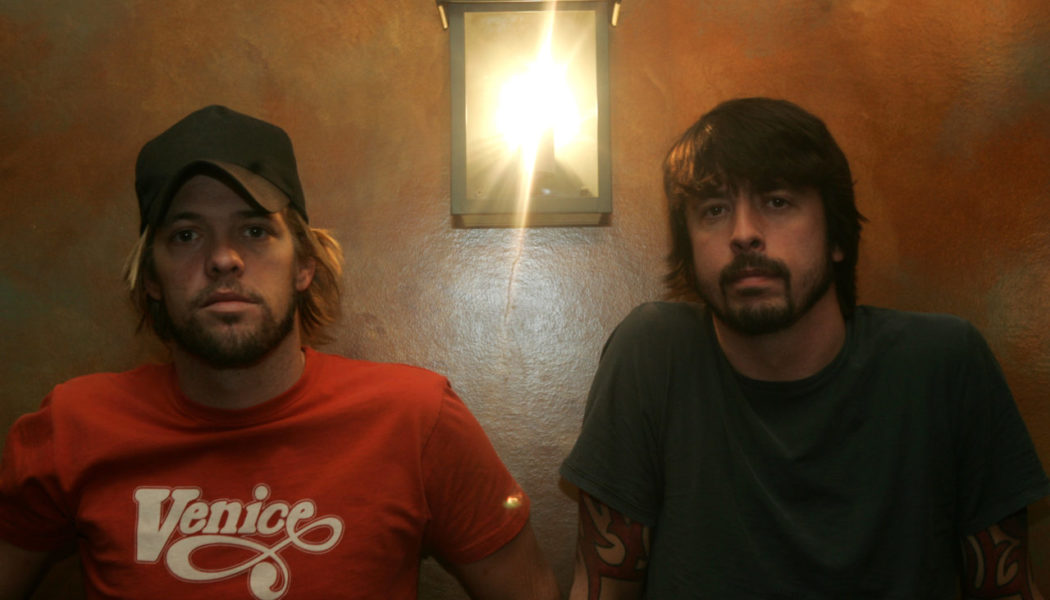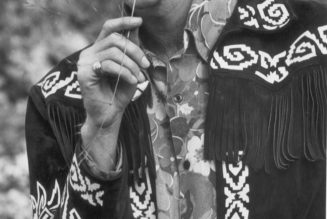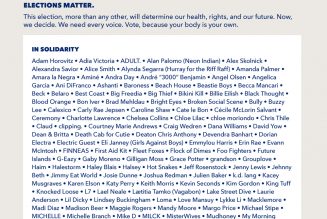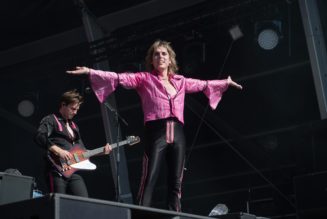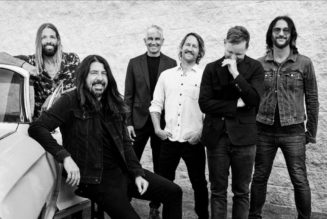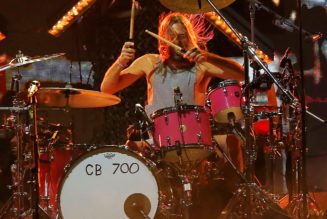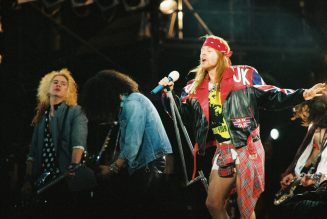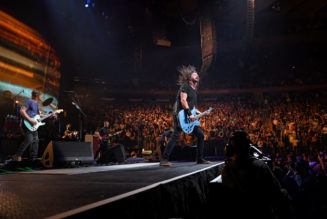This article originally appeared in the August 2005 issue of SPIN. In honor of the Foo Fighters headlining Lollapalooza again tonight, we’re republishing this article.
The road to Studio 606, the new multimillion-dollar Foo Fighters headquarters, isn’t paved with gold. Rather, it’s paved with common asphalt, marred by rush-hour traffic, and dotted with all the symbols of suburban sprawl: take-out chicken joints, chain drug stores, a drive-thru Starbucks. On the heels of the band’s 2002 back-from-the-brink-of-breakup album, One by One (like all Foo releases, certified platinum), singer/guitarist Dave Grohl could’ve set down roots anywhere. After all, Foo Fighters are that rarest of breeds—a remarkably consistent, long-lasting rock band—and their global success, not to mention Grohl’s net worth from his tenure in a certain grunge trio, afforded the band the opportunity to build their playground wherever they fancied. So they chose a shady (in both senses) street in Northridge. California, nestled in the heart of the much-mocked San Fernando Valley, the porn capital of the world.
Like, what?
“Dude, I love the Valley!” says Grohl with a laugh, as he lounges in the complex’s upstairs kitchen. All of the fixtures are gleaming and the walls still have that Benjamin Moore scent. He and the other Foos (drummer Taylor Hawkins, guitarist Chris Shiflett, and bassist Nate Mendel) recorded their recent double album, In Your Honor, in the studio just beneath our feet. Grohl lights the first of many cigarettes and continues: “I grew up in suburban Virginia, and I’m no stranger to strip malls, but I love the Valley mostly because of the stigma. The Valley is not cool. I made a point of wearing an ENCINO T-shirt that I bought at the drugstore to the MTV Movie Awards, because I want Lindsay Lohan and fucking Hilary Duff to hate me because I live in Encino.”
Still, why choose to live in such an uncool place?
Grohl shrugs. “There are some really good delis out here.”
SPIN: Taylor said the biggest difference between recording here and recording at your house in Virginia is that he didn’t have to worry about spilling shit in your kitchen.
GROHL: It’s true. It makes a big difference when you don’t have to clean up barf from your carpet. I puked in my office once and there’s still a stain. That’s a nice souvenir. I look at it now and go, “Awww, our third record!”
The hallway that leads from the 606’s entrance to its massive, high-tech studio isn’t paved at all, but it is lined with gold—not to mention platinum. Every inch of wall space is covered with framed plaques and citations, millions of records sold in what seems like nearly every country on earth, all of which feature the musicianship of 36-year-old David Eric Grohl. Each Foo Fighters record is represented, as are discs by Queens of the Stone Age, Tenacious D, and of course, Nirvana (but no Probot, his metal side project from last year). Grohl has had more rock’n’roll success in 15 years than most Hall of Famers have had in their entire careers, and here it’s all on display, enough bling glinting off the track lighting to make Jay-Z jealous. The whole thing seems ridiculously daunting—one can almost imagine the tremors felt by the three other Foos every time they show up for work. Dude, don’t let me be the one that fucks this whole thing up!
Are the records meant to intimidate people?
GROHL: [Laughs] Naw, it’s just shit you wouldn’t want in your house. What you’re supposed to notice are all the photos in between the plaques: Johnny Cash, Jimmy Page, John Bonham, David Bowie, fucking David Lee Roth. Then you should see the gold record of Led Zeppelin II that’s hanging above the control room wall. That’s to make you go, “Okay, we have to do something real here. Don’t cheese out!”
But you otherwise don’t seem to hold on to much from your past.
Yeah, I travel light and have since I dropped out of high school to live out of a bag in a van with people I don’t know. I have mountains of old punk-rock posters and lyrics and tour journals, but ehhh…I don’t like stuff. It’s just more to miss when you’re gone.
You mentioned that the albums and photos hanging in the hall inspire you. What else do you draw on for inspiration?
It changes, but to this day, it’s when you hear an album that inspires you to write or play yourself. It’s just all about the shameless fucking naked passion. Like the new High on Fire Blessed Black Wings record. It’s the most brutal metal album I’ve heard in years. Or the first time I heard My Morning Jacket’s At Dawn—it still makes me cry. And I’m inspired by connection with other people. I’ve always felt like an outsider.
These are the two sides of Dave Grohl. Not electric and acoustic, like the discs that make up In Your Honor, but Unbelievably Humble Nice Guy versus Outrageously Focused Superstar. Luckily, it just takes a moment in his kinda hyper, ultra-polite presence to realize the first one wins out every time. It’s only after Grohl has dismissed his zillions of records sold that I notice the smaller accolades mixed in—awards from regional papers proclaiming Nirvana 1992’s “Best Up-and-Coming Heavy Metal Band” or the trophy for “Most Promising Drummer” of 1991.
Why make a double album?
GROHL: When we came off the last year and a half of touring, I didn’t know what to do. Am I supposed to jump back in and shit out another CD and speed up my contract and make sure we get a bigger light show? It didn’t seem creatively rewarding. So I started writing this acoustic stuff because I wanted to find a movie to score; one of my favorite records is Ry Cooder’s soundtrack to Paris, Texas. But after demoing all this acoustic music and doing Probot, I thought, “Why can’t this be on Foo Fighters records?” I didn’t want to do a solo record, and who’s to say what we should sound like? And I think the band finally trusted me to try it.
Well, they joined the band knowing it was essentially a solo project.
Yeah, but we immediately started writing music as a band from the second record on. We’re a great band that plays well together, but it has to have someone at the fucking wheel.
Your lyrics seem much more up front and revealing on this record. You even included “Friend of a Friend” [written in 1990], the first song that you’ve admitted is about Kurt Cobain.
I used to back away from things that were too raw, lyrically. I’d shy away from saying something that was revealing—like, “Uh oh, they’re going to know what I’m talking about!” But finally I said, “Fuck it, that’s ridiculous. I can’t do that for the rest of my life.”
I hear it all the time: Dave Grohl is the nicest guy in rock. How did you get that rep?
[Blushes] I don’t know. Because I don’t do coke? I suppose it’s just not taking anything for granted and feeling lucky to be here. I don’t know—there’s fucking thousands of nice guys in the world! Maybe it’s because I have a goofy smile and people are like, “Awww, he’s like a little kid!” I’m 36! My fucking ankles are killing me!
To hear Cobain’s widow, Courtney Love, tell it, Grohl’s niceness is merely a cover for his amazing Zelig-like ability to be around the right people at the right time, from wandering into the first show of emo-forefathers Rites of Spring to drumming with hardcore stalwarts Scream to moving to Olympia, Washington, and joining his new roommate Kurt Cobain’s band. After all, this one-third partner of Nirvana, LLC, was the group’s sixth drummer. “Dave gets to walk away unscathed and be the happy guy in rock, when he’s one of the biggest jerks,” says Love. “He’s been taking money from my child for years.”
Even Grohl himself couldn’t have predicted a second career like the one he’s had with Foo Fighters. After what was essentially a homemade solo demo tape transformed into a 1995 1.3 million seller, the next album, 1997’s The Colour and the Shape, kick-started radio-friendly emo and led two members—drummer William Goldsmith and guitarist Pat Smear—to quit (Goldsmith because he tired of playing in a band with “two drummers,” and Smear because he was sick of touring). Two more albums followed, as did one more guitarist, and Hawkins’ near-fatal booze ‘n’ pills overdose.
You’re famous for being able to get along with nearly everyone—from your ex-punching bag Gavin Rossdale to former members of Led Zeppelin. What’s your secret?
GROHL: No matter how much I dislike a band, I could still get drunk with them. My musical taste is irrelevant when it comes to social situations. Also, when I started playing in hardcore bands, it was strictly for the love of playing music. There was no career option. It was something to get out of the furniture warehouse. A $7 per diem was more than enough—and it was that way when I joined Nirvana. Even after we signed that fucking contract [with Geffen], we all slept in the back of that fucking gasoline-smelling Chevy van. It was disgusting! But it was also fun. At some point it became more and more flooded with career ambition, and that can pollute things. The people who are usually dissatisfied are the ones who aren’t getting what they think they deserve.
Even so, Foo Fighters were not particularly satisfied with One by One. “If you think about things too much, they get kinda sterile, as we found out,” says Hawkins, 33. “There are great songs there,” says Shiflett, 34. “And then there are…parts of great songs.” In contrast, In Your Honor, despite its ambition, was recorded quickly and (relatively) painlessly.
On the rock disc, Grohl’s vocals are raw and exposed as never before, shredding to bits on anti-Bush screeds like the title track and on the lacerating (yet still radio-friendly) first single, “Best of You.” (That song, like many on the album, was inspired by Grohl’s experiences traveling on John Kerry’s campaign bus. Says Mendel, 36, with a sad smirk, “We’re responsible for tens and tens of new voters.”) But it’s with the acoustic disc that Grohl really steps outside of his wheelhouse. Chock-full of mopey and dreamy sketches, it features an eclectic range of guests, from Led Zeppelin’s John Paul Jones on “Miracle” and “Another Round” to Norah Jones on the Bossanova-inflected “Virginia Moon” (“She’s a pro,” Grohl says of his unlikely duet partner). Even the emblem-like cover art seems to scream, “Take me seriously!”
But back at 606, Grohl is merely screaming with laughter. Hawkins, clean and sober but still manic, is showing Dave his favorite Freddie Mercury outfits from a dog-eared ’70s Queen tour program and suggesting which might be best for a photo shoot. The skintight jester costume? Or the schoolboy knickers, sans shirt and shoes? This is the real Foo Fighters dynamic: a bunch of married—or, in Hawkins’ case, engaged—rock’n’roll nerds cracking each other up. Shiflett is amusingly complaining about his hellacious commute to the Valley from his home near the ocean and about how Quentin Tarantino—or “Fatty Queerantino,” as he calls him—sat behind him at the MTV awards and spilled red wine down his wife’s shirt. Bassist Nate Mendel, the second-longest tenured Foo, is the quiet one. Yet even he can be wound up, and after Hawkins teases him about master-minding the Foo Fighters’ mega-success while still on tour with his previous band, Sunny Day Real Estate, Mendel begins concocting a series of fake hobbies (falconry and collecting Jimmy Carter memorabilia) to make his contributions to the band seem more interesting.
And then there’s Hawkins, a man who within five minutes of meeting someone is liable to have his shoes off, his hands wildly air-drumming favorite Dennis Wilson solo tracks while he expounds on the glories of trading award-show gift bags to his fiancee in exchange for “thank-you lovin’.” The drummer—who will be releasing a good-natured, glammy solo album early next year credited to Taylor Hawkins and the Coattail Riders—is so California he borders on self-parody. At 606, in between bites of a steak lunch, he tells a long story about how he once berated Flea for living in L.A.’s boho Los Feliz neighborhood because it was, in the Chili Peppers’ bassist’s words, “more punk rock.” (“I was like, ‘Dude, if I had as much fucking money as you do, I’d live in a big-ass mansion on the water in Malibu!’ And guess where Flea lives now? Fucking Malibu, bro!”) But he also has a genuine sweetness to him—even when he’s wondering if Lindsay Lohan is “a puker.” And he obviously feels indebted to Grohl, his “best friend” and the one person fit to go toe-to-toe with him on Styx trivia, for standing by him through his 2001 OD.
Camaraderie aside, this is still Grohl’s show—no matter how hard he tries to hide it. The hierarchy of the band is evident, from the other Foos joking about why the 606 was built so far from where they live (Shiflett: “Dave lives five minutes from here. It’s straight downhill from his house. He could just get on a skateboard and shoot straight here!”) to their explanations for the acoustic disc (Mendel: “Because Dave wanted to do it.” Hawkins: “It’s not like a Foo Fighters record— it’s like the fucking Dave Grohl Orchestra!”). Even the building’s mail slots are labeled DAVE and CHRIS/NATE/TAYLOR. Yet, whether it’s the eternal humility of drummers or his grounding in the egalitarian D.C. hardcore scene, Grohl refuses to admit to his own stardom, describing his role in the band as “the one who takes out the trash.”
These days, a lot of so-called punks are down with glitz and following all the rules.
There was a switch after the early ’90s, which I totally understood. I mean, come on: You get sick of seeing a guy who looks like the gas attendant down the street running a band. You want Marilyn Manson. You want something larger than life.
But the cycle is so sped up now; there are fans switching their allegiance from Dashboard Confessional’s stripped-down acoustic to the glam makeup of My Chemical Romance in, like, 18 months.
See, that’s the thing that freaks me out. It’s that risk of regret. [MCR will] undoubtedly regret that red eye makeup in six years, and we’ll look at it like they were Winger or something. But a lot of the bands that get a bad rap I actually like. The beauty of the melody in that song “Helena”? Oh my God, that could be a fucking Queen song!
Do you ever get the urge to put on your Gandalf the Grey hat and caution these younger bands against making mistakes?
Bands can recover from bad hair, from genres that have disappeared, from members quitting, or lineup changes. The things that bands can’t recover from are death and drugs. And that’s the bottom line. If there were anything I could tell a young band, it’d be just “Don’t do coke.” Go take Ecstasy and fuck your friends and buy giant bags of weed and wear a condom. But it happens over and over again anyway. Musicians are a funny bunch of idealistic dreamers and self-destructive depressives. Those are the type of people that usually flash out quick. And it’s easy for me to say—I haven’t done drugs since I was 20 years old. I don’t want to sound like a self-righteous straight-edge freak from D.C., but…
Not when I heard you referring to Jack Daniels as “rocket fuel” earlier.
There’s that. So, yeah, do whatever you want. Just don’t fucking die. That’s the one thing that’ll change everything. Slap on all the makeup you feel like. Just don’t stick needles in your arms.
If, ten years into his new life as the “emotional lightning rod” of a band (a phrase best uttered, as he himself does, with a faux-French whine), Grohl isn’t living in the spotlight, he’s at least grown awfully comfortable in it. A few days after first speaking with me, the Foos take a private plane from San Francisco (where they had played a sold-out concert) to New York, with new friend (and Hawkins’ idol) former Police drummer Stewart Copeland in tow. Then the band “hosts” MTV2 for 24 hours straight, during which time they lead a street drum circle with Copeland, referee a hot-dog-eating contest, marry a couple of fans, send a roadie on a date to Bubba Gump’s shrimp restaurant, wrap Grohl in foil and put him out in the sun, and dance wildly to A-Ha videos. They also program their favorite videos in their favorite categories (Mendel’s is indie, Shiflett’s is glam, Hawkins’ is prog, while Grohl does Headbanger’s Ball) and laugh it up with such comedy buddies as Amy Poehler, David Cross, Fred Armisen, and Janeane Garofalo.
In the green room about 12 hours into the silliness, the mood is remarkably festive. All of Team Foo are present—manager, road crew, wives, and friends—and everyone is drinking light beer and eating chips and dip. After a midnight plugged-in performance, the band, exhausted yet wild-eyed, arrive for high-fives and drinks. Nate and Chris change into Paul Frank pj’s (they were free) while shirtless Taylor gives everyone sweaty hugs. Grohl calmly pours shots of Crown Royal and beams from ear to ear. I commend him on looking so strangely fresh, and he laughs: “I haven’t slept in three days, and I don’t know when it’s going to stop. But it’s okay!” He leans in close. “Because I’m a little drunk right now!” And then he rubs his eyes, downs another drink, grabs his wife of three years, former MTV producer Jordyn Blum, and leads a parade of cameras outside into the crowd of insomniacs, cops, and fans gathered on Broadway. When everyone in the green room notices what’s going on, they drop their nachos and run after him. As usual, it’s impossible for anyone to keep up.
